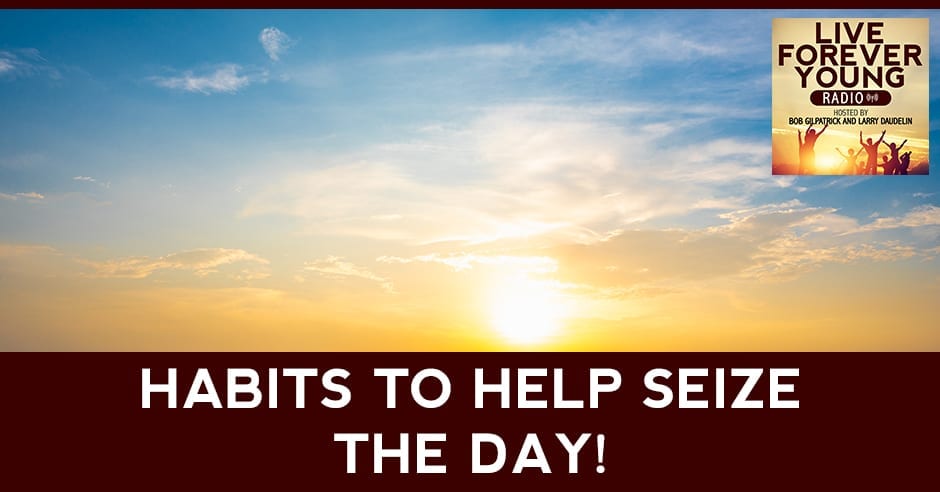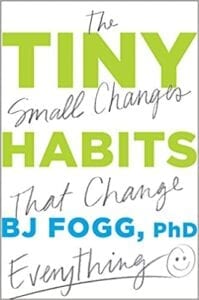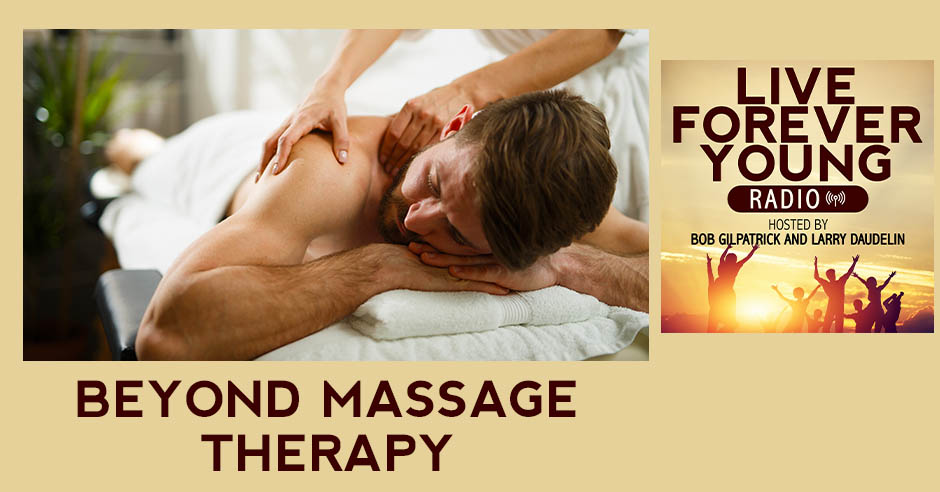Habits To Help Seize The Day!

How you wake up in the morning sets the pace for the day. Having a morning routine that makes the most out of those first moments of a new day can make the difference between a good and a bad day. Humans are creatures of habit. The key to having a great day every day is in forming new habits that get you started with positive vibes. In this episode, Bob Gilpatrick, our holistic health specialist, and Larry Daudelin share some great tips on how to start the day out right. They also answer a question from one of their listeners. Plus, Bob shares a new technique called revision scissors that can help you be your best you!
Watch the podcast here:
Listen to the podcast here
[fusebox_track_player url="https://feeds.podetize.com/ep/TU1BoDVqF/media" title="Habits To Help Seize The Day!" social_linkedin="true" social_pinterest="true" social_email="true" ]
Habits To Help Seize The Day!
Tips To Start The Day Out Right
On this episode, Bob and Larry discuss the importance of morning routines and how to create highly effective habits in the morning that can help you start your day out right. We'll also answer another question from one of our readers and Bob will share a new technique called revision scissors that can help you be your best you. Sit back, relax and get ready to live forever young.
---
I'm here with Larry and Rollie, and we're happy to talk about morning routines with you on this episode. There's a famous psychologist named Dr. Joe Dispenza, and we all know about Dr. Joe, we follow his teachings and he says that the average person, when they wake up in the morning, they do the exact same thing that they did the day before. They're just mulling through their morning without much intention. He said that as a result, you tend to get the same things for your day over and over again. Instead, he encourages people to live from a vision of the future and use your morning purposefully. If you're going to do the same routine every day, that’s okay but make sure it's very purposeful in something that you planned out. Larry, if you wouldn't mind to start out, tell us some of the things you do for your morning routine and how you focus to make sure that you're not living from the past, but instead living from a vision of the future.
It's actually simple, but it's forming the habit. That's the tough part that I had to realize that it takes 28 days minimum to form a habit. I was living it like everybody else was living it. Some days if I went to bed not feeling so good, I brought that into the next morning. I got up, maybe I was tired. I'm trying to relate to what possibly people out there are dealing with. I know what it was dealing with. Bob and I got together and we said, “Let's make some changes. Let’s both form new habits.” Now that I've done this, this routine is positive and easy for me. Number one, I don't get up with any bad thoughts. I get up and say, “It's going to be a good day. I'm going to get a lot done, do the best that I can.”
There are certain things you have to do. It works for me. If you hear anything that you think is going to work for you, that's what you do. The important things are to stay at it as a ritual almost every morning. Other than Sunday, I get out of bed, put my feet on the side. I breathe deep, taking that day, taking that energy that breaths have giving me. I think about deep breathing. I take a few minutes and I do that. Sometimes it's a minute and when you're deep breathing, a minute is a long time. I have a bottle of water next to my bed. I sit down and I drink that whole bottle of water slowly as I'm thinking positive thoughts for the day. I drink the water calmly, think positive thoughts, and say, “I'm ready now to set the day out.”
I wanted to ask you while you're on that. Are you an early riser?
I get up at 6:00 every day.
Studies show people who are early risers are usually more successful in life and they have more effective things and get them done earlier and quicker because they're up and ready to go.
I didn't used to get up at 6:00, but since I've been doing these, I get up and sit on the side of the bed. I think positive thoughts to start my day with, I drink my water, and then I will go in and try to get ready for my day. After that, I go up and make sure that I have my vitamins out. I have my Boomer Boost drinks already prepared because I prepare them ahead for the whole week. I'm pretty much all done with all of that by 6:30, then I get up and I do exercises. I do pushups. I do pull ups. I stretch. I have one of those anti-gravity machines I get on. I do those types of rituals. The important thing is, when do you start to do this? You need to do and start doing this right now. That's how you form a habit. That's how you get disciplined, I'd like you to start there to form a 28-day habit.

I can add a couple of other things that might help people to start their day right. I agree with the water 100%. There are studies that show that if you drink 16 ounces of water first thing in the morning, when you wake up and you need to lose weight or release weight, you'll lose a pound a month or 12 pounds a year even if you don't do anything else. The other thing that I like to do, Larry, when I first wake up, I’m similar to you. I have a pulsed electromagnetic field device. Once I grab my water, I will lie on my PEMF mat for eight minutes, which helps get your circulation going. It’s helpful for your energy and your overall health.
While I'm doing that, I'll focus on gratitude. I begin thinking about what I'm grateful for, I always have the intention that it will culminate in me feeling grateful for being alive. There's something special about getting to the point where you're grateful to be alive that changes. This is another PEMF thing, your heart muscles are actually putting off an electromagnetic field. If you linger in gratitude and get to the point where you're grateful to be alive, you change that electromagnetic field. That then has a positive effect on other people during the day because that field goes out a number of feet. When you're in close presence, like we are in this room, my field is interacting with yours and affecting it and vice versa. It’s coming from your heart muscle. If you know this, and you focus on things you're grateful for, you also want to do what's called aspects.
Larry, for you, Zella, your dog is something that you're grateful for. What you want to do is linger in the gratitude because the longer you linger, the more your field changes. You want to linger in the gratitude and the way you do it is with aspects. You say, “What is it that I love about Zella? I love how soft Zella’s fur is. I love her beautiful eyes. I love how she puts her head onto my shoulder, where I'm allowed to pet her and talk to her. I love how she's always excited to see me in the morning.” What you've done by thinking of 4 or 5 aspects of Zella, you've spent more time in gratitude. You go onto the next thing. “I'm grateful for my wife. I'm grateful for my children,” and you want it to lead to, “I'm grateful for being alive. I'm grateful that God gave me this amazing life and I'm grateful to be alive.”
That grateful to be alive is where all of a sudden, your electromagnetic field begins to change. That's why gratitude is important. The other thing that I like to do once my eight minutes is up with my mat I like to sit on the edge of the bed and pretend that I'm a child on Christmas morning. Think about it if every day you sat on the edge of the bed and said, “If I was a child, if I was seven years old again, and it was Christmas morning, how would I be feeling about the day?” You talk about anticipation for the future, living from an anticipated positive future that will get you into that state faster than anything.
The other thing, Larry, is exercise, same thing. I do exercises from Psychocalisthenics. I do head circles, which helps you to calm your mind and be able to get into your heart. When you put your hands across your heart, after the head circle and breathe in, you're now entering your consciousness that is being relocated into your heart. Your heart has neurons, like your brain is made up of neurons. Your heart has 40,000 neurons in it. Your heart is another brain. The other thing is nutrition. Larry, you and I have similar nutrition regime. I make sure that's part of my morning.
When I do that, I become well-nourished because I have the total health system that I don't need to eat anything until 5 or 6 hours later. We have lunch together quite often during the week. We usually split a small sandwich because we're well-nourished. The other thing that I do when that part of my routine is done, I plan my day. I have a professional planner from Brendon Burchard. It's a leatherbound one and it has four columns in it. It helps you set your spiritual mindset for the day and who needs to be on your A-game for the day and you write that down, “If I was to live out my own highest thought for myself, what would be two things I would be sure to do?”
These are the types of prompts that are in Brendon's planner. It gives you those prompts. It also has a spot to put in things you have to do at certain times. There’s a calendar and there’s, “These are the three most important things I have to do.” That's the last part of my routine before I leave the house. We can talk a little bit about guided meditation, which I do most every day, also in work with minority.
What do you do, Bob, for example, I know that people are out there reading going, “I don't have time for this?”
It's funny that you say that because you're right. There are people. We’ve got a question. It says, “When I wake up, it seems like it takes a long time to get going. I feel like I'm wasting an hour of my day. I don't have a ton of time in the morning. What are some simple things that I can do to make my morning better?” This comes from Martin in Virginia.
Martin, I'm just wondering what kind of sleep you're getting. That's a lot to do with it. If you're not getting 8 or 7 hours of sleep minimum, you could start your day out sluggish. The routine that we're talking about, if you get on it, you'll start sleeping better also. When you wake up, you're going to feel better, even if you get up and you're tired, just start to do the things, the simplest things that you can do.
It's a good point. In regard to sleep, a lot of times, if people are groggy in the morning, it's because they woke up in the middle of a sleep cycle. You sleep in these hours and a half cycles, and melatonin is your hormone of sleep. It rises and falls in your brain an hour and a half cycles. You want to get up when you're at the end of a cycle because if you wake up in the middle of a cycle, you are going to feel groggy for a long time afterwards. Larry, you mentioned that you don't use an alarm clock that's why you feel energetic in the morning. You are allowing yourself to wake up naturally at the bottom of a sleep cycle.
If you have to be up at a certain time, say you have to be up at 6:30 in the morning. You want to go backwards and say, “Based on this hour and a half idea, when would I have to be in bed asleep?” The answer is 11:00 at night. If you look at hour and a half, hour and a half, it’s 6:30, that would be 7.5 hours. That's ideal. If you're going to set your alarm for 6:30, you want your plan to be asleep at 11:00. If you're going to take, for example, our Goodnight Formula sleep aid, you want to take that at 10:00 because it takes about an hour to kick in. At 11:00, you're going to start to feel sleepy. You get to bed, make sure it's very dark in the room and fall asleep.
If you wake up in the middle of the night, it's probably going to be at the end of a sleep cycle. If you have to get up, use the bathroom, great but go back to sleep. People say, “I can't fall back to sleep.” What do we do? Concentrate on relaxing your tongue because when your tongue is relaxed, it's hard to stay awake. Do that and go right back to sleep. The alarm goes off at 6:30. You'll feel much better than if you woke up at 6:00 or 7:00. In regard to programming your mind to go back to sleep, it depends on what time it is but what you want to do is backtrack from 6:30. If you're awake at 5:00, you want to say, “I'm going to sleep for an hour and a half.”
If you are awake at 3:30, you want to say, “I'm going to sleep for three more hours.” Two other things we've talked about before, Larry, was the water in the morning. If people get into that habit, you'll have more energy in the morning just from drinking the water. Also, oxygenate your brain better. The deep breathing exercises, you can do an exercise called arm circles, where you're going to swing your arms in big circles while you take deep breaths in, that will help wake you up in the morning and then take your full nutrition regime early in the morning. We have a testimonial, Rollie, with a man that talked about how he had low energy. He was very overweight. He started taking his Total Health System from Boomers Forever Young in the morning. The next thing he said that within five minutes of taking that drink, his energy came all the way up for the day.
That's important because you've got to start. It's not like you said your body, it relies on that nutrition, especially when you start getting into the habit and creating that as part of your morning routine. What you were saying is some of the quick things that somebody doesn't have a lot of time to do would be making sure you have water on your bed stand, wake up and drink it. Like Larry does in the morning, take some deep breaths. That doesn't take long. He said, “It takes about a minute.” Another thing to get you up and moving, Bob, you said, is these arm circles.
Bring your arms together, up and around and back down. Up and around on your breath in.

The beauty of that, you're accomplishing two things at once. You’re getting your arm circles in and in some degree of exercising and you're breathing.
It's funny, you said you’ve got to get disciplined and I agree that's easier said than done. One of the things that we usually share with you is the tiny habits and that gives you a format to help create new habits.
To create highly effective habits and you can incorporate this right into your morning routine. Let's talk about that because it's one thing to talk about what to do here, what to do new, but to make it a habit. From the book, Tiny Habits, they have the ABC routine. The A stands for an Anchoring event. A fancy phrase for meaning something happens. In this case, this is waking up in the morning. The A is I woke up in the morning, that's going to happen every day. You don't have to worry about it not happening. The second thing, B is the Behavior. Let's start with simple with the water that we talked about. Make sure you have your water at the side of the bed.
It’s 16 ounces of water, whether it's in a water bottle or whatever. That becomes the behavior. You wake up in the morning, “I'm choosing to have this behavior, I'm going to drink my water.” The C is a Celebration. The celebration is important because this is how human minds work. They tend to repeat things that they celebrate. This is why you see sports teams making celebrations when they score a touchdown. Your celebration can be something simple. It could be as simple as, “Yes, I did it. I got my first day done. I drank my water and I'm going to do it again tomorrow.” In this case, creating these habits is that simple. You can start with one. If the next part of your morning routine is going to be focusing on gratitude, then the next day, go ahead and add that in. Your anchoring event is you woke up in the morning, the behavior is, “I'm going to drink my water and do my focus on gratitude. When I'm done with that, I'm going to celebrate.” You might want to do that for 2, 3, 4 days before you add in another one of your habits, like exercise and stack them on top of each other, always celebrate. As you do this over and over again, it's going to become that habit Larry talks about in 21 to 28 days. It's going to become the new you. This is a good thing because the new you is focusing your mind on living from this vision of the future, because you've done all of the routines we're talking about and made your plans for the day.
You've made plans that include things related to your own spirit. Remember the question, “If I was to be the highest version of myself that I could possibly accomplish, what would it be? What would I look like? What would I feel like? What kinds of things would I do? How would I treat people?” Your own highest thought for yourself, this is living from the future. That’s very important to add into your routine somewhere, to take a moment to say, “What is my own highest thought for myself?” That now begins to expand because you’re like, “How do I want to act?” I want to act like this best, Larry, the best Rollie, the best Bob. Some people have religion. They have some person or a God that they worship. It's like, “How would I be like that?” For people with a religion, you can use that to help create your own highest thought for yourself. This is how you use tiny habits to anchor these things in.
Let's say some people like to start their day out with a little prayer. That's wonderful. If you want to do that, that is powerful.
Especially if they are prayers of gratitude. You don't want to make it right away prayers for asking for things. You want to start out with prayers of what you're grateful that you already have and especially grateful to be alive.
You were saying something about it, almost the next morning starts the night before, like a look at the day before you go to sleep. Review the day.
This is where we can talk about tapping. In this show we're doing tapping, which we've talked about before, also called the emotional freedom technique. This is an opportunity to combine it with another very powerful tool that's called revision scissors. Revision scissors came from Neville Goddard, who was a teacher and philosopher. He was a well-known, famous, and revered philosopher. He once said, “If the only thing I ever did in my life was leave the world with the technique of revision scissors, I would have fulfilled my life purpose.” That's how powerful he felt this was. Let's talk about how we do that and when you do it. When you do this is in the evening time or just before you go to bed, and this is a review of the day.
We've gone to all this trouble to create new habits to do this new morning routine, set our intention with the highest thought for ourself, maybe with some details. We're sitting at 10:00 at night, and we're going to make a review, how did I do? You look back on your day, imagine a timeline of the day with the past being to your left and the future is to your right. Here we are in the middle and you look back and say, “Was there a time during the day, beginning with my morning routine and continuing through if I was at work or with friends, whatever, where I did not live up to this highest thought for myself or my plans?” For example, one of your goals is to be patient and treat everyone with compassion, and you made a slip up during the day.
Sometimes it could be a little slip up. Sometimes it can be a disaster and you want to go back on your timeline, “That was around 10:00 in the morning. I got impatient with so-and-so.” What you're going to do is look at that as if it's a piece on your timeline, almost like the old ribbon of the old movies, the reel of the movie and how they used to cut those out and splice them in. There's the sniff them out and splice in and like that. That's what you can do. Imagine a pair of scissors and that spot during the day that you didn't like, you're going to imagine that you're cutting it out. That part of the day is dissipating into gas and floating off into the air. What you're going to do next is, come back to the center and say, “If I did it perfectly, what would it look like?” You replay the scenario and you see yourself acting according to your own highest thought. You make a picture of that, sounds you would have said, the smile on your face. You bring that picture and you splice that into your timeline. That's the revision. The scissors cut it away. It was making room for the revision, which is what you made up in your mind and you put there.
The reason this works is your unconscious mind doesn't know that's not what actually happened. Your unconscious mind, once you grabbed that perfect you and put it in that timeline, your unconscious mind, which is driving 90% of your behavior goes, “That's what I did.” This is a trick. You’re tricking your subconscious mind to believe that, “I had this good part of my day.” Why do you want to do that? It’s because you're building a habit. Your unconscious mind goes, “We did that right, where we're celebrating,” because you want to celebrate when you make the revision. “I made the revision.” It's part of the habit. It's way more likely that the next day you'll act like that. Here's the potentiating factor, use tapping.
We've made the revision, we've got our perfect self set and put the timeline and you celebrated it.
Now, your unconscious mind thinks that's what happened. You're in our anchor and then with tapping. You're going to tap by your fingertips. We showed in the previous episodes, and you're going to repeat a phrase that says something like this, “Even though during the day I had this slip up and had to use these revision scissors, I completely love and accept myself anyway. I'm so grateful now that I realize tomorrow, I can have a perfect day and not even need these revision scissors. I'm feeling that complete peace about the whole thing.” Cross your hands across your heart and take a deep breath in, drop your chin down and your hands down and breathe out and say quietly, you might even see flashing lights in your visual field. The reason you're doing that technique at the end is this makes you feel peaceful.
You've stated while you're tapping, I'm feeling at complete peace. This is making an association with the actual feeling of peace. When you push on your heart, you take a breath in, you have a surge of oxytocin. Oxytocin is made both in your brain and in your heart. It's your molecule of love and compassion. All of a sudden, “I am feeling peaceful. I now have a paired association between feeling peaceful and this beautiful exercise that I just did.” It becomes the new you. This is a technique of living from a highly desired future that you're envisioning. You altered your future with this exercise because you're way more likely the next day to act how you created it with your mind.
Wouldn't it be nice if that did go back in time and fix it? In a way, it does in your mind.

It does in your mind, it does fix it because your unconscious mind thinks you fixed it. What it does is because your intention is to live with a vision for the future, your vision for the future got better because your unconscious mind thinks that you already did it perfectly once. It's like, “If I did it once, I can do it again.”
It's creating a better reality for that. It’s a habit.
This is combining the teachings of Neville Goddard, the teachings of Gary Craig, the teachings of John Caputo in Bioenergetic Therapy, the teachings of Alexander Lowen all mixed in together in a technique that people can learn and use.
That's going to make you feel peaceful, and that's going to carry forward to the other people.
Larry, thanks for all your insight. Rollie, thank you for running the board, participating, helping us keep things organized. In conclusion, I would say if anybody has any questions for us, go to LiveForeverYoungRadio.com. Communicate with us. There's a form in there where you can communicate with us. I would encourage people to focus on the gratitude part like we said, in linger and gratitude. The longer you linger in gratitude, the better the field responds to you and the more positive your energetic field becomes. Be sure to say that phrase, “If I was to be my own highest thought for myself, what would it be like? What would it feel like? What would I do?”





Leave a comment